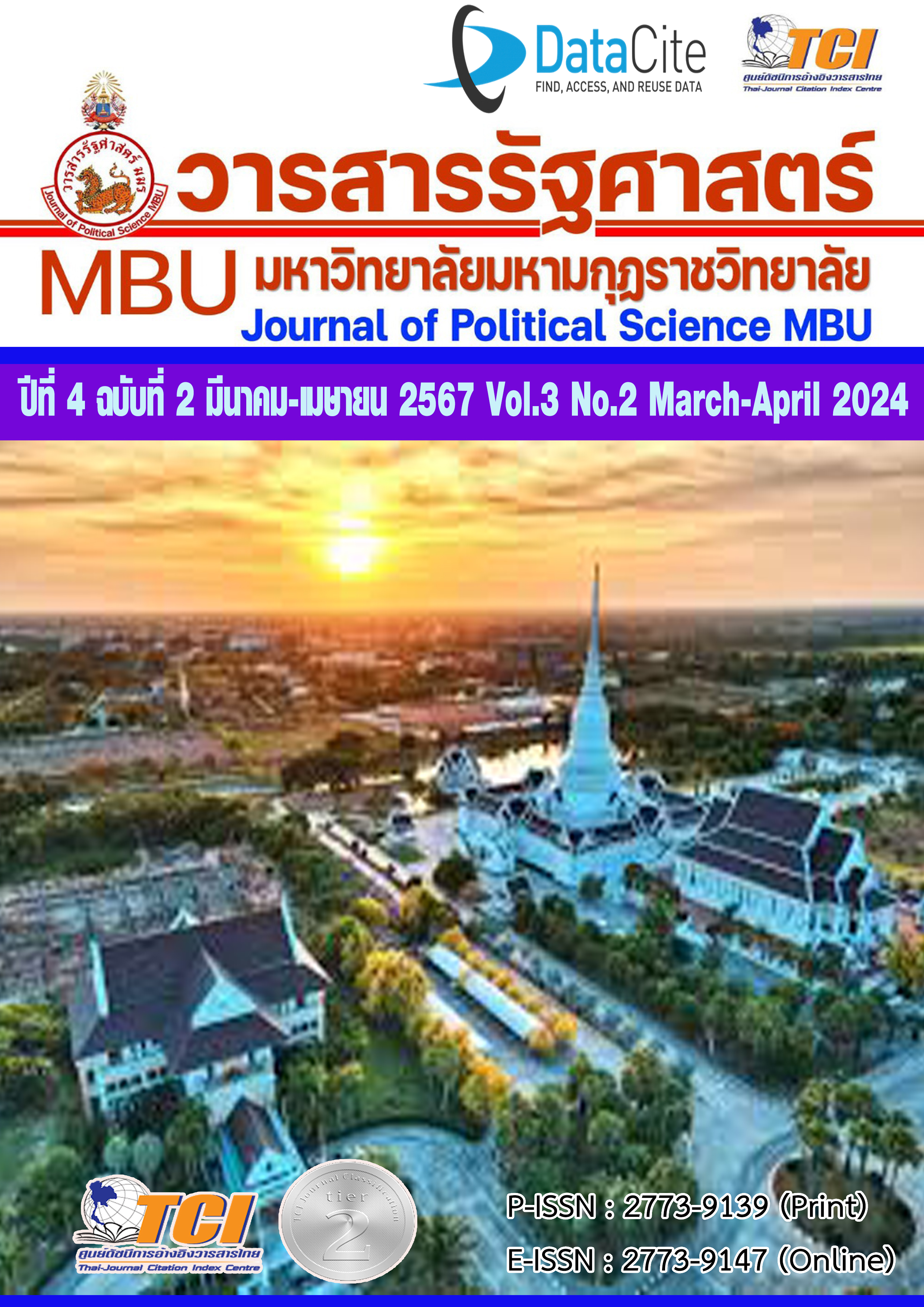LEADERSHIP DEVELOPMENT IN21ST CENTURY
Main Article Content
Abstract
This article aims to study leadership development that is consistent with changes in the 21st century. There are 3 elements of leadership development: 1) Power is the careful use of power under the basis of ethics. 2) Influence is the mechanism for Use power to change behavior or attitude without needing to force, force or direct command. 3) Motivation is motivation through gathering information. and methodical data analysis To understand human behavior and communication skills Including using the ability to build trust in the rapidly changing and complex 21st century. Effective leadership is more important than ever. Leadership development is therefore essential for individuals and organizations to succeed. Leadership development in the 21st century must take into account the unique characteristics of this era, including rapid technological change. The rise of distributed work and sustainability challenges Leadership in the 21st century requires a variety of qualities, including 1) the ability to adapt and change, 2) excellent communication and negotiation skills, 3) emotional intelligence and empathy, 4) vision and Inspiration 5) Ability to collaborate and build teams. Leadership development can be achieved through training. Consulting and learning from experience Creating a leadership development program that is comprehensive and tailored to the unique needs of each individual and organization is important. Developing leadership in the 21st century is an investment in the future of individuals and organizations. By cultivating the necessary qualities and skills Effective leadership can navigate the rapid changes and challenges emerging in the 21st century and create lasting results.
Article Details

This work is licensed under a Creative Commons Attribution-NonCommercial-NoDerivatives 4.0 International License.
References
กล้าศักดิ์ จิตต์สงวน และคณะ. (2557). รูปแบบการพัฒนาภาวะผู้นำเชิงกลยุทธ์สำหรับผู้บริหารโรงเรียนระดับมัธยมศึกษา. วารสารวิชาการ มหาวิทยาลัยอีสเทิร์นเอเชีย, 4 (1), 201-211.
กวี วงศ์พุฒ. (2557). ภาวะผู้นำ (พิมพ์ครั้งที่ 5). กรุงเทพมหานคร : ศูนย์ส่งเสริมวิชาชีพ.
กัณฑ์กณัฐ สุวรรณรัชภูม์. (2556). ภาวะผู้นำกลยุทธ์: รูปแบบของผู้นำยุคใหม่. วารสารบริหารการศึกษามศว. 10 (18),1-12.
กีระพงศ์ ผาภูมิ. (2560). การพัฒนาตัวบ่งชี้ภาวะผู้นำแบบโลกาภิวัฒน์ของผู้บริหารสถานศึกษาโรงเรียนในสังกัดสำนักงานเขตพื้นที่การศึกษาประถมศึกษาภาคตะวันออกเฉียงเหนือ. วารสารศึกษาศาสตร์ฉบับวิจัยบัณฑิตศึกษา มหาวิทยาลัยขอนแก่น, 11(1),19-28.
ฉันทนา จันทร์บรรจง. (2562). ภาวะผู้นำ. กรุงเทพมหานคร: โอเดียนสโตร์.
ดารุวรรณ ถวิลการ. (2560). การพัฒนาภาวะผู้นำเชิงกลยุทธ์ของนักศึกษา สาขาวิชาการบริหารการศึกษา. วารสารศึกษาศาสตร์ฉบับวิจัยบัณฑิตศึกษา มหาวิทยาลัยขอนแก่น, 11(1),56-66.
ทิพาวดี เมฆสวรรค์. (2559). กล้าคิด กล้าทำ กล้านำ กล้าเปลี่ยน. กรุงเทพมหานคร: เอ็กซเปอร์เน็ท.
พระพิศาล วิสาโล และคณะ. (2560). ภาวะผู้นําเชิงปฏิสัมพันธ์ในศตวรรษที่ 21. วารสารวิชาการพระพุทธศาสนาเขตลุ่มแม่น้ำโขง, 2(1),1–12.
วรวรรษ เทียมสุวรรณ และคณะ. (2562). ภาวะผู้นำเชิงกลยุทธ์ในศตวรรษที่ 21.วารสารบัณฑิตวิทยาลัยมหาวิทยาลัยสวนดุสิต, 15(2),1-15.
อรุณ รักธรรม. (2558). การพัฒนาและการฝึกอบรมบุคคล : ศึกษาเชิงพฤติกรรม. กรุงเทพมหานคร: เสนาธรรม.
Yukl, G. (2021). Leadership in Organizations. 7th ed. New Jersey: Pearson.
Day, V. D. et al. (2019). An Integrative Approach to Leader Development. New York: Taylor and Francis Group.


